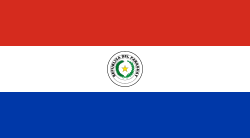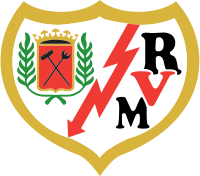Rayo Vallecano de Madrid, S.A.D. (Spanish pronunciation: [ˈraʝo βaʎeˈkano ðe maˈðɾið]), often abbreviated to Rayo, is a Spanish football team based in Madrid, in the neighbourhood of Vallecas. Founded on 29 May 1924, the club currently play in La Liga, Spain's top-flight division. Home games are held at the 14,708-seater Campo de Fútbol de Vallecas stadium.
Rayo has competed in one European competition, the UEFA Cup in the 2000–01 season. The club made it to the quarter-finals before losing to fellow countrymen Deportivo Alavés 4–2 on aggregate.
History
Rayo Vallecano saw the light of day on 29 May 1924 in the hometown of Prudencia Priego, wife of the club's first president Julián Huerta. Greatly inspired by River Plate (a Football club from Argentina), in 1949, after an agreement with Atlético Madrid, a red diagonal stripe was added to the team's kit, and the club reached Tercera División for the first time in its history.[1]
One of the perennial yo-yo clubs of Spanish football, and always in the shadow of the two biggest clubs in the city (Real Madrid and Atlético Madrid), Rayo Vallecano spent many years during the 1980s and 1990s moving back and forth between La Liga and Segunda División. They appeared to have consolidated their top flight status after gaining promotion in 1999, and the team's most successful season came in 2000–01 when they reached the quarterfinals of the UEFA Cup, going out only to eventual runners-up Deportivo Alavés;[2] Rayo finished ninth in the previous campaign, but entered the competition via the fair play draw.[3]
However, the club shortly thereafter fell on hard times, enduring successive relegations in 2003 and 2004. For 2005–06 manager Míchel, a Real Madrid legend in the 1980s and 90s, was hired.[4]
Rayo finished the 2006–07 season in second place in Segunda División B, winning the promotion play-off semifinal but losing in the final to SD Eibar (1–2 aggregate).[5] The following campaign, the team returned to division two after a four-year absence after a victorious run in the playoffs, disposing of Benidorm CF in the semifinal and Zamora CF in the last game 2–1 on aggregate.[6]
In the first season back in the second tier of Spanish football, Rayo finished comfortably, often either in or just outside the promotion places. That same year, its women's team was crowned league champions for the first time, thereby qualifying for the UEFA Women's Champions League, but was eliminated 2–5 on aggregate in the round-of-32 by Russia's WFC Rossiyanka.
In 2010–11, Rayo Vallecano ranked in second position and returned to the top flight after an eight-year absence, only trailing champions Real Betis in spite of very serious economic problems.[7][8][9] In late March 2012, in support of the 2011–12 Spanish protests, the squad decided to take one day off from training to join the demonstrations.[10]
In August 2015, Rayo Vallecano purchased the majority of Oklahoma City FC, a NASL expansion franchise which had yet to officially play a game renaming the club to Rayo OKC. It was the first ever entry of a Spanish club into the American sports market, and mirrored a 2013 sponsorship agreement with Qbao in terms of expanding the club's profile overseas.[11]
Club background
- Agrupación Deportiva El Rayo (29 May 1924 – 13 November 1947)
- Agrupación Deportiva Rayo Vallecano (13 November 1947 – 1995)
- Rayo Vallecano de Madrid (1995–present)
N.B. Affiliate of Club Atlético de Madrid in 1949–50
Season to season
- Federación Regional Castellana de Fútbol (1928–30; 1939–49)
- 7 seasons in Primera Categoría
- 3 seasons in Segunda Categoría
- Federación Obrera de Fútbol (1931–36)
European history
Current squad
- As of 1 February 2016[12]
Note: Flags indicate national team as defined under FIFA eligibility rules. Players may hold more than one non-FIFA nationality.
Out on loan
Note: Flags indicate national team as defined under FIFA eligibility rules. Players may hold more than one non-FIFA nationality.
Staff
Notable former players
Note: this list includes players that have played at least 100 league games and/or have reached international status.
Managers
| Dates |
Name |
| 1944–46 |
 Cayetano Sardinero Cayetano Sardinero |
| 1946–47 |
 Julián Antón Julián Antón |
| 1947–48 |
 Luis Pérez Luis Pérez |
| 1948–49 |
 Tomás Rodríguez Rubio Tomás Rodríguez Rubio |
| 1949–50 |
 Ramón de la Fuente Ramón de la Fuente |
| 1950–51 |
 Anselmo Nogales Anselmo Nogales |
| 1951–52 |
 Félix Huete Félix Huete |
| 1952–53 |
 Lorenzo Sánchez Villar Lorenzo Sánchez Villar |
| 1954–55 |
 Cándido Machado Cándido Machado |
| 1953–54 |
 Patricio Sánchez Calleja Patricio Sánchez Calleja |
| 1954–55 |
 Manuel Alepuz Manuel Alepuz |
| 1955–56 |
 Cándido Machado Cándido Machado |
| 1956–58 |
 Ramón Colón Ramón Colón |
| 1958 |
 Cándido Machado Cándido Machado |
| 1958–59 |
 Lino Taioli Lino Taioli |
| 1959 |
 Heriberto Herrera Heriberto Herrera |
| 1959–60 |
 Ramón Colón Ramón Colón |
| 1960 |
 Alfonso Aparicio Alfonso Aparicio |
| 1960–61 |
 Martín Camino Martín Camino |
| 1961 |
 Ramón Cobo Ramón Cobo |
| 1961 |
 Joseíto Joseíto |
| 1961–64 |
 Herrero Herrero |
| 1964–67 |
 Pedro Eguiluz Pedro Eguiluz |
| July 1967–June 69 |
 José Antonio Olmedo José Antonio Olmedo |
|
|
| Dates |
Name |
| Nov 1993–Feb 94 |
 Fernando Zambrano Fernando Zambrano |
| Feb 1994–Nov 94 |
 David Vidal David Vidal |
| Nov 1994–June 95 |
 Paquito Paquito |
| June 1995–Oct 95 |
 Pedro Mari Zabalza Pedro Mari Zabalza |
| Oct 1995–April 96 |
 Marcos Alonso Marcos Alonso |
| July 1996–Feb 97 |
 Paquito Paquito |
| Feb 1997–March 97 |
 Fernando Zambrano Fernando Zambrano |
| March 1997–June 97 |
 Máximo Hernández Máximo Hernández |
| 1997–98 |
 Josu Ortuondo Josu Ortuondo |
| July 1, 1998–June 30, 2001 |
 Juande Ramos Juande Ramos |
| July 1, 2001–Oct 1, 2001 |
 Andoni Goikoetxea Andoni Goikoetxea |
| Oct 1, 2001–June 30, 2002 |
 Gregorio Manzano Gregorio Manzano |
| July 1, 2002–Jan 20, 2003 |
 Fernando Vázquez Fernando Vázquez |
| Feb 2003–April 03 |
 Gustavo Benítez Gustavo Benítez |
| April 2003–June 03 |
 Antonio Iriondo Antonio Iriondo |
| June 2003–Nov 03 |
 Julen Lopetegui Julen Lopetegui |
| Nov 10, 2003–Feb 15, 2004 |
  Jorge D'Alessandro Jorge D'Alessandro |
| Feb 2004–June 04 |
 Txetxu Rojo Txetxu Rojo |
| June 2004–June 05 |
 Carlos Orúe Carlos Orúe |
| July 1, 2005–June 30, 2006 |
 Míchel Míchel |
| June 16, 2006–Feb 15, 2010 |
 Pepe Mel Pepe Mel |
| Feb 15, 2010–June 30, 2010 |
 Felipe Miñambres Felipe Miñambres |
| July 1, 2010–June 30, 2012 |
 José Ramón Sandoval José Ramón Sandoval |
| July 1, 2012– |
 Paco Jémez Paco Jémez |
|
Club presidents
| Dates |
Name |
| 1924–26 |
Julián Huerta |
|
| 1926–27 |
José Montoya |
| 1927–28 |
Galo Andrés |
|
| 1929–30 |
José Antonio Sánchez |
| 1930–31 |
Anastasio Sánchez |
|
| 1931–36 |
Ángel Martínez |
|
| Dates |
Name |
| 1939–43 |
Miguel Rodríguez Alzola |
|
| 1943–46 |
Ezequiel Huerta |
| 1946–48 |
José Rodríguez Rubio |
|
| 1948–55 |
Miguel Rodríguez Alzola |
| 1955–58 |
Jerónimo Martínez |
|
| 1958–61 |
Tomás Esteras |
|
| Dates |
Name |
| 1961–65 |
Iván Roiz |
|
| 1965–73 |
Pedro Roiz |
| 1973–78 |
Marcelino Gil |
|
| 1978–80 |
Francisco Encinas |
| 1980–81 |
Luis Quer |
|
| 1981–89 |
Francisco Fontán |
|
| Dates |
Name |
| 1989–91 |
Pedro García Jiménez |
|
| 1991–94 |
José María Ruiz Mateos |
| 1994–2011 |
Teresa Rivero |
| 2011– |
Raúl Martín Presa |
|
Stadium
Campo de Fútbol de Vallecas is a football stadium located on Calle Payaso Fofó 1, Vallecas. Opened on 10 May 1976, at first it was called "New Stadium Vallecas", but in January 2004, 13 years after the arrival of the Ruiz-Mateos family in 1991, it changed denominations, as the wife was also named by her husband, business man José María, the first woman president of an elite football team.
It has a capacity of 14,708 spectators in an all-seated format, and dimensions of 102x64m. Additionally, one of the goalends does not have a grandstand, just a big wall with information panels.
In June 2009, the club announced plans for the construction of a new stadium.
Miscellaneous info
- Rayo Vallecano was Laurie Cunningham's last club – he was killed in a car crash just outside Madrid in 1989, after a sole season. He also had represented neighbours Real Madrid for four years.
- In 2014, 85-year-old Vallecas resident Carmen Martínez Ayuso was evicted from her house after living there since the 1960s. Rayo Vallecano and particularly coach Paco Jémez were touched by her story, and subsequently offered to fund Martínez for the foreseeable future. [14]
References
External links
|
|---|
|
- History
- Players
- Managers
- Seasons
- Europe
- Statistics
- Honours
| | | Teams | |
|---|
| | Home stadium | |
|---|
| | Seasons |
- 1950–51
- 1951–52
- 1952–53
- 1953–54
- 1954–55
- 1955–56
- 1956–57
- 1957–58
- 1958–59
- 1959–60
- 1960–61
- 1961–62
- 1962–63
- 1963–64
- 1964–65
- 1965–66
- 1966–67
- 1967–68
- 1968–69
- 1969–70
- 1970–71
- 1971–72
- 1972–73
- 1973–74
- 1974–75
- 1975–76
- 1976–77
- 1977–78
- 1978–79
- 1979–80
- 1980–81
- 1981–82
- 1982–83
- 1983–84
- 1984–85
- 1985–86
- 1986–87
- 1987–88
- 1988–89
- 1989–90
- 1990–91
- 1991–92
- 1992–93
- 1993–94
- 1994–95
- 1995–96
- 1996–97
- 1997–98
- 1998–99
- 1999–2000
- 2000–01
- 2001–02
- 2002–03
- 2003–04
- 2004–05
- 2005–06
- 2006–07
- 2007–08
- 2008–09
- 2009–10
- 2010–11
- 2011–12
- 2012–13
- 2013–14
- 2014–15
- 2015–16
|
|---|
|
|
|---|
| | 2015–16 clubs | |
|---|
| | Former clubs | |
|---|
| | Competition | |
|---|
| | Statistics and awards | |
|---|
| | Finances | |
|---|
| | Associated competitions | |
|---|
| |
|

